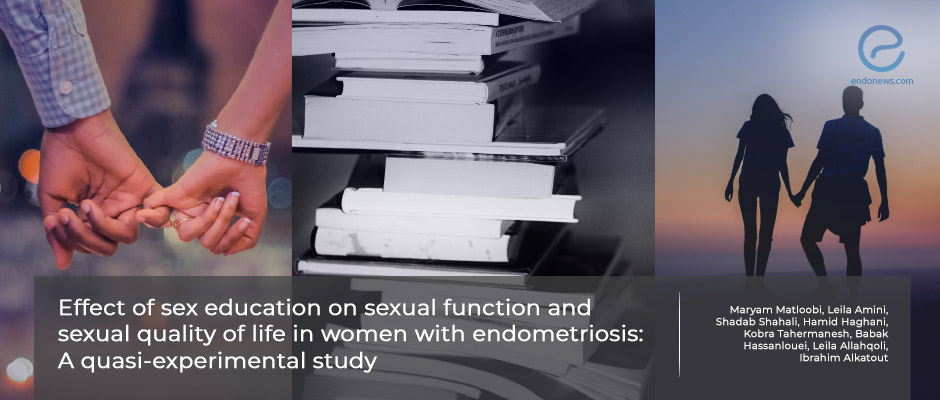Sex Education For The Sexual Quality Of Life
Aug 26, 2022
Sex education provides improvement in the sexual life of women with laparoscopically-confirmed diagnosis of endometriosis.
Key Points
Highlights:
- Sexual dysfunction often develops in women with endometriosis based on various reasons such as pelvic pain, dyspareunia, and psychological aspects of the disease.
Importance:
- Sex education may help to increase the quality of sexual life of women with endometriosis.
What’s done here?
- In this prospective quasi-experimental study, the effect of sex education on sexual function in women with endometriosis was investigated.
- The study population consisted of 72 participants (36 in the intervention group that received sex education+ and 36 in the control group that did not).
- The benefit of the sex education program was assessed using the female sexual function index (FSFI) and the sexual quality of life-female score (SQOL-F).
- Reproductive-aged women who were sexually active and had a laparoscopically-confirmed diagnosis of endometriosis were included.
- Participants were evaluated with both questionnaires before the intervention, as well as 8 and 12 weeks after completion of the educational sessions.
Key results:
- The demographic and clinical characteristics of the patients, and the rates of female sexual dysfunction were similar.
- Sexual function was improved significantly in the intervention group regarding desire, arousal, lubrication, orgasm, and satisfaction subscale scores, and the pain subscale score between pre-intervention and 12 weeks post-intervention.
- The sex education program was found to have a significant effect on sexual quality of life in women with endometriosis.
Strengths and Limitations:
- The main strength of the study is that it is the first publication in the literature to evaluate the effect of sex education on sexual functions.
- The quasi-experimental design, non-randomization, and limited period of follow-up were the limitations of the study.
Lay Summary
The most common symptoms of endometriosis are dysmenorrhea, dyspareunia, chronic pelvic pain, and infertility. Decreased quality of life due to pelvic pain, dyspareunia, and psychological conditions such as anxiety and depression can lead to sexual dysfunction in women with endometriosis. Improving sexual functions in these women is an important part of the management of endometriosis.
Matloobi et al., from Iran and Germany, published a prospective study titled “Effect of sex education on sexual function and sexual quality of life in women with endometriosis: A quasi-experimental study” in the International Journal of Gynecology and Obstetrics. The authors aimed to assess the effect of sex education on sexual function in women with laparoscopically-confirmed endometriosis. They divided the study population into two groups: the intervention group receiving sex education and the control group receiving no sex education, with 36 patients in each group. The female sexual function index (FSFI) and the sexual quality of life-female score (SQOL-F) were used to evaluate whether there would be any improvement or not in the participants.
Sexual function was improved significantly in the intervention group regarding desire, arousal, lubrication, orgasm, and satisfaction subscale scores, and the pain subscale score between pre-intervention and 12 weeks post-intervention. The sex education program was found to have a significant effect on sexual quality of life in women with endometriosis as the secondary outcome.
"Sex education appears to be promising for reducing sexual dysfunction and improving sexual function and sexual quality of life in women with endometriosis.” the authors added.
Research Source: https://pubmed.ncbi.nlm.nih.gov/35514234/
endometriosis sex education sexual function sexual quality of life FSFI SQOL-F pain desire arousal lubrication orgasm satisfaction

